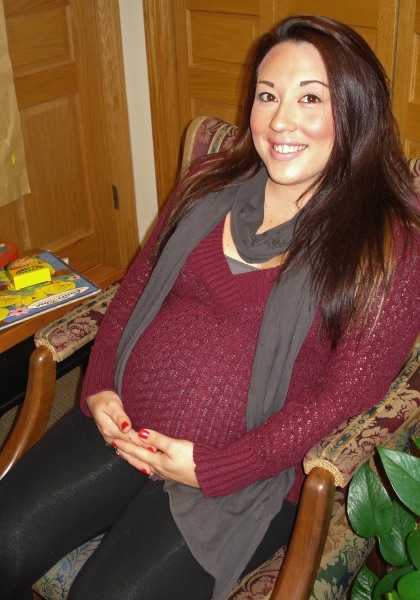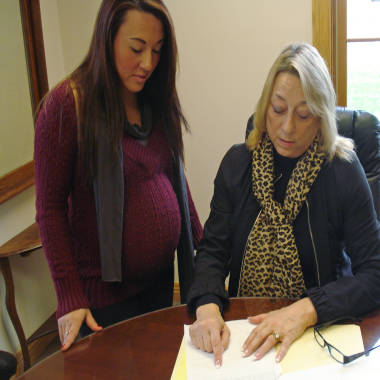
Melissa Wanta / for NBC News
Alicia Beltran, 28, of Jackson, Wisc., went to a prenatal visit -- and ended up in handcuffs.
On July 2, Beltran, 28, met with a physician’s assistant at West Bend Clinic at Saint Joseph’s Hospital in West Bend, Wis., for her prenatal visit. When asked to detail her medical history, Beltran admitted a past struggle with the painkiller Percocet. But that was all behind her, Beltran said: She had been taking Suboxone, a drug used to treat Percocet dependency. Lacking health insurance and unable to afford the medication, Beltran had used an acquaintance’s prescription and self-administered the drug in decreasing doses. She had taken her last dose a few days before her prenatal visit.
At the hearing, her lawyers say, the judge told Beltran that an attorney would not be provided for her at that time but that she could seek counsel for her next hearing in the case. And yet, a lawyer had been appointed to represent her fetus. “It’s wrong that an unborn child gets an attorney but Alicia Beltran, the mother of that unborn child did not,” said Vanden Heuvel.
Emails and phone calls to Family Court Commissioner Dolores Bomrad and her office were not returned. Assistant District Attorney of Washington County Mandy Schepper declined to comment on the case.

Melissa Wanta / for NBC News
Alicia
Beltran, who was forced to spend more than two months in a drug
treatment facility despite her insistence that she was not abusing
drugs, talks with her attorney, Linda Vanden Heuvel of Germantown, Wis.
In a petition filed in U.S. District Court in Milwaukee -- the first federal challenge of an arrest of a pregnant woman under such a statute – her lawyers claim that Beltran’s constitutional rights were violated in numerous ways. The language of the Wisconsin statute is vague and lacking in medical terminology, they argue, leaving too much room for speculation. Further, they say the statute fails to guarantee due process, as well as violates other rights, including privacy and physical liberty.
In cases like Beltran’s, “the woman loses pretty much every constitutional right we associate with personhood,” said Lynn Paltrow, executive director of the National Advocates for Pregnant Women and a co-counsel in Beltran’s case.
Experts say that criminal prosecutions of pregnant women, as well as forced drug or psychiatric treatment, have been on the rise in recent years in cases of suspected substance abuse, especially as some states adopt laws granting rights, or “personhood,” to fetuses.
Supporters of these laws say they are intended to protect unborn children. “Child abuse is child abuse, whether it’s in the womb or out of it,” said Jennifer Mason, communication director for Personhood USA, a non-profit organization seeking personhood status for fetuses. Advocates of fetal personhood claimed a victory in January when the Alabama Supreme Court upheld the inclusion of unborn children in that state’s child endangerment statute.
Some experts argue that prosecuting pregnant women can ultimately put fetuses at risk, especially when healthcare providers and social workers are the ones reporting women to authorities. There is evidence indicating that women who fear criminal charges or other state intervention are less likely to seek medical care or be honest with their doctors, said Kenneth De Ville, a medical humanities professor at East Carolina University in Greenville, N.C., who published a study on the Wisconsin law. “Prenatal care is really the best thing you can do to enhance fetal health,” he said. “And you’re driving women away from prenatal care.”
The American Congress of Obstetricians and Gynecologists has argued that women who seek prenatal care should not be exposed to criminal or civil penalties and calls for expanded and affordable alcohol and drug treatment services for pregnant women.
Mason said she agrees that women should be given professional treatment before state intervention, but that when there is clear evidence of fetal harm, criminal charges are often appropriate. “It’s a very fine line. The medical professional has to be aware of what puts babies in danger,” she said. “I do not think a pregnant woman’s freedoms should be taken away, but child abuse cases are child abuse cases and have to be treated the same way as a newborn in the home.”
For Beltran, the consequences of her case have hit hard. Her family struggled to visit her regularly during her stint at Casa Clare Women’s Facility in Appleton, Wis., a two-hour drive from her home. After being away from work for an extended period, Beltran lost her job in the food service industry, according to her lawyers. She was released earlier this month, but with the case still open, she is still at risk of being taken into custody or ordered into further treatment, Paltrow said.

.jpg)





